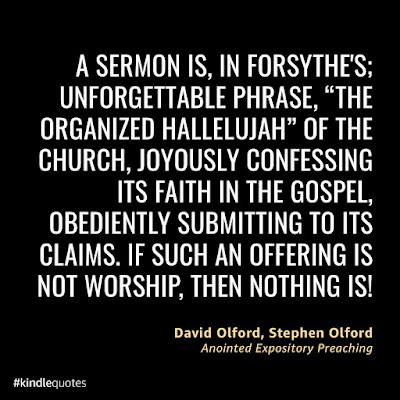There is a reason why evangelical church buildings have the pulpit and its lectern centrally located. The Word of God is meant to direct attention to the God of the Word. The preaching of the Word is central to worship. Since worship is meant to point us to the Lord Most High, there is no better way than via the avenue of Scripture.
We must see to it that our praise is Scripturally grounded. Music is an important way we express this. Yet, if the lyrics are merely meant to arouse emotions without communicating truth through sacred melodies, then we may leave the building feeling inspired, but without offering acceptable worship in Spirit and truth. While the melody is important, it is the message that is fundamental. Nor, are we to spend most of the hour singing and then a brief sermonette. As has been said, “Sermonettes produce Christianettes.” We show his fallacy when we speak of the singing in this way, “First, we have worship and then the preaching.” Singing is only a part of worship, not the sum of it.
We must see that our prayers are Scripturally directed. Prayers are almost treated as filler—a necessary start and finish to the worship. Yet, our Lord demanded that His Father’s house be a “house of prayer,” (Matt.21:13a). Prayer must be more than a mindless repetition of pious phrases. The Word of God is to be the launching pad for lifting holy hands to God in prayer. Scripture directs our language and develops our faith. Biblical threads should be woven into the very fabric of all our prayers.
We must see that our preaching is Scripturally saturated. We do not casually read a text and then quickly move on to what we want to say. The text is to drive all that is said from the pulpit. The Word of God is to be central. This begins with the honor shown in the way it is read. Look at this passage from Nehemiah 8:1-12:Now all the people gathered together as one man in the open square that was in front of the Water Gate; and they told Ezra the scribe to bring the Book of the Law of Moses, which the Lord had commanded Israel. So Ezra the priest brought the Law before the assembly of men and women and all who could hear with understanding on the first day of the seventh month. Then he read from it in the open square that was in front of the Water Gate from morning until midday, before the men and women and those who could understand; and the ears of all the people were attentive to the Book of the Law. So Ezra the scribe stood on a platform of wood which they had made for the purpose; and beside him, at his right hand, stood Mattithiah, Shema, Anaiah, Urijah, Hilkiah, and Maaseiah; and at his left hand Pedaiah, Mishael, Malchijah, Hashum, Hashbadana, Zechariah, and Meshullam. And Ezra opened the book in the sight of all the people, for he was standing above all the people; and when he opened it, all the people stood up. And Ezra blessed the Lord, the great God. Then all the people answered, “Amen, Amen!” while lifting up their hands. And they bowed their heads and worshiped the Lord with their faces to the ground. Also Jeshua, Bani, Sherebiah, Jamin, Akkub, Shabbethai, Hodijah, Maaseiah, Kelita, Azariah, Jozabad, Hanan, Pelaiah, and the Levites, helped the people to understand the Law; and the people stood in their place. So they read distinctly from the book, in the Law of God; and they gave the sense, and helped them to understand the reading. And Nehemiah, who was the governor, Ezra the priest and scribe, and the Levites who taught the people said to all the people, “This day is holy to the Lord your God; do not mourn nor weep.” For all the people wept, when they heard the words of the Law. Then he said to them, “Go your way, eat the fat, drink the sweet, and send portions to those for whom nothing is prepared; for this day is holy to our Lord. Do not sorrow, for the joy of the Lord is your strength.” So the Levites quieted all the people, saying, “Be still, for the day is holy; do not be grieved.” And all the people went their way to eat and drink, to send portions and rejoice greatly, because they understood the words that were declared to them. (NKJV)
It is one reason I have chosen across the years to have people bring their Bibles, open their Bibles, stand for the reading of the Bible and read the Bible clearly and emphatically. Throughout the message, the stress is upon what God has to say, and then what we need to do about it. The conclusion is a call to action, resting on the authority of the Word of God. Preaching is an act of worship—all that the Man of God is offered on the altar as a sacrifice in presenting the message of God.
These thoughts were inspired from reading Appendix A in Stephen and David Olford’s book, “Anointed Expository Preaching.” For a fuller understanding, I commend it to you.



No comments:
Post a Comment